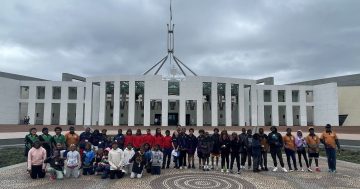
Legendary squash player Jahangir Khan with former Pakistani cricket captain Shahid ‘Boom Boom’ Afridi in Canberra. Photo: Genevieve Jacobs.
As a cricketer, Pakistan’s Shahid Afridi was known as ‘Boom Boom’.
The nickname was apt. In his first international innings in 1996, Afridi broke the record for the fastest century in one-day international cricket (ODI), reaching his hundred from 37 balls. The 11 sixes he struck also equalled the record for most in an ODI innings.
He’d go on to be a powerhouse in Pakistan’s national team, captaining the squad as an all-rounder who also took 541 international wickets.
But post-cricket, it’s arguable that he’s making even more of an impact with the Shahid Afridi Foundation, tackling large, complex, urgent education and health issues in his home country through his Hope Not Out initiative.
He was joined in Canberra this week by Jahangir Khan, widely regarded as the greatest squash player of all time, for a fundraising dinner that brought together many of Canberra’s Pakistani community.
And there’s plenty of need to be met: 70 per cent of rural Pakistanis have little or no access at all to health care, education is limited (particularly for girls) and even more so in regional Pakistan, and damage from the 2022 floods, which displaced nearly 8 million people and destroyed 2 million homes, is still widespread.
Afridi, who has been criticised in the past for his conservative beliefs, told Region he is nevertheless a strong believer in women’s education.
“Honestly, I’m very lucky to be the father of five daughters,” he said. “I think if the mother is educated, so the society and community is educated.
“Education is vital for a successful nation and the need is greatest in rural communities where families are poorer and girls are less likely to be educated in the first place.”
The Shahid Afridi Foundation has partnered with two other education-focused NGOs to provide 15 operational schools primarily dedicated to education for girls.
The foundation also emphasises trade skills for boys, designed to alleviate the pressure on children from low-income families to work as unskilled labourers from a young age. Incentives for continuing education include providing food aid for families whose children have strong attendance records.
There’s also a focus on healthcare in a country where infant mortality is one of the highest in the world. The foundation is establishing regional hospitals and mobile maternal and infant healthcare facilities in remote Baluchistan and Punjab, providing maternal care, neonatal care, eye care, pathological tests and ultrasound facilities to 300 villages.
Clean water supply is also a priority for SAF, which has installed pipelines, tanks and hundreds of hand pumps in rural areas, many of which are powered by solar panels. The foundation estimates more than 250,000 people now have access to clean water as a result.
“We’ve made tours to America and Europe to raise funds for these causes; we are long overdue to come here to Australia,” Jahangir Khan told Region. The squash legend is now the foundation’s president, working closely with Afridi to leverage their sporting success into lasting outcomes for the least privileged in Pakistan.
As dozens of cricket fans, young and old, lined up to have photographs taken with the sporting superstars, the result looked like a win for those who need it most.
You can find out more about the Shahid Afridi Foundation and make a donation through the charity’s website.













